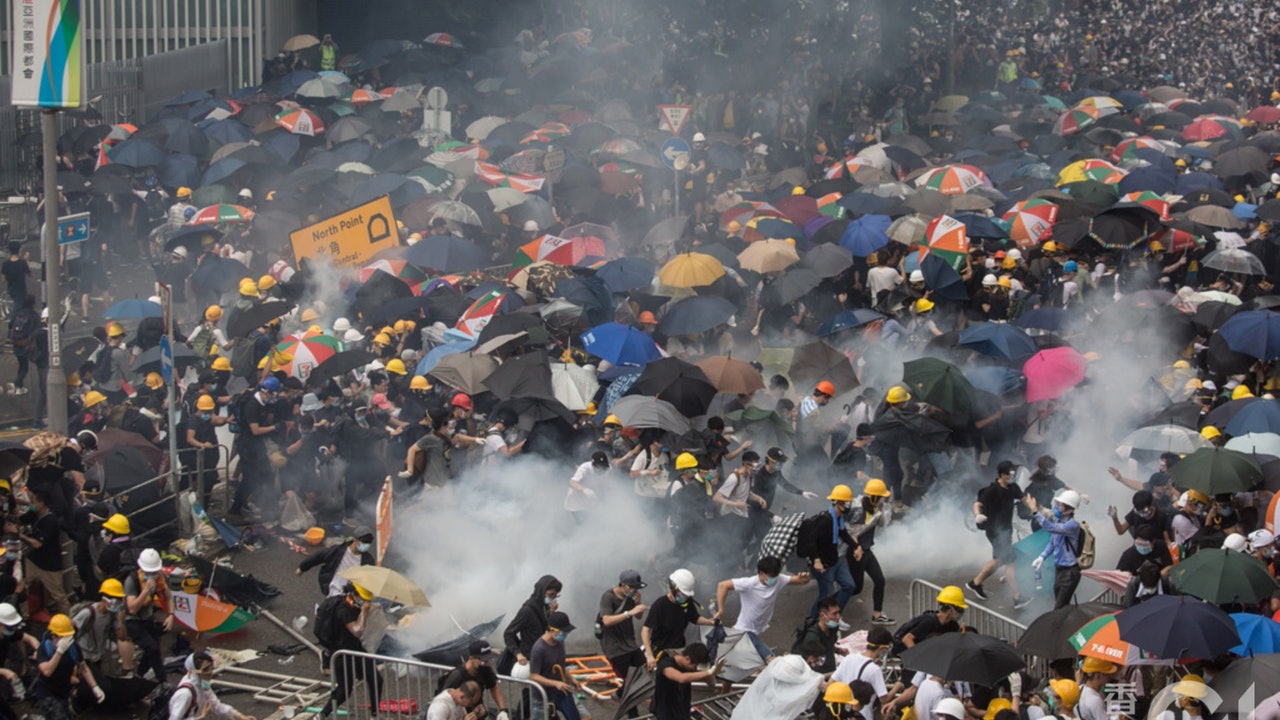Introduction: On July 1, according to the established schedule, the 25th anniversary of the return of Hong Kong and the inauguration ceremony of the sixth government of the Hong Kong Special Administrative Region were held at the Hong Kong Convention and Exhibition Center. There is no reason to change such a good system, and it must be maintained for a long time.” He also raised four points of hope.
Before July 1st, "Hong Kong 01" interviewed Chen Duanhong, a professor of Peking University Law School, to systematically summarize the past 25 years of Hong Kong. The interview was published in four articles. This is the first article. The significance of the turmoil of the amendment to Hong Kong and the importance of judging the public opinion of Hong Kong are unfolding.
In Chen Duanhong's view, it is necessary to be cautious about inevitability, and the anti-revision turmoil is mainly dominated by human factors.
Hong Kong 01: As a scholar who has been concerned about Hong Kong issues for a long time, in your opinion, what needs to be summed up and reflected on in Hong Kong in the past 25 years?
In the past 25 years, the central government has gone through three stages of non-intervention, making a difference, and emphasizing comprehensive governance. How will the central government's governance model change in the future?
Chen Duanhong:
Everyone is summarizing and reflecting.
I think the most fundamental thing is public opinion.
There is a saying that people's hearts are unpredictable. In ancient China, it was also said that "the people can carry a boat or capsize it".
Why can people carry a boat or capsize it?
It is because people have wills and thoughts, and if public opinion changes and becomes chaotic, society will be chaotic.
I think when doing research on Hong Kong issues, especially when making predictions, the most difficult thing is to observe and predict changes in public opinion.
Chen Duanhong, a professor at Peking University Law School, accepted an exclusive interview with Hong Kong 01, systematically summarizing the 25th anniversary of Hong Kong's return to the motherland.
(State Information Office)
After 2019, I had an idea to create an internal publication called "Pingmo", which means "Hurricane starts at Pingmo". Judge a concept, a statement, a thing before it becomes a hurricane.
Traditional Chinese medicine talks about the treatment of disease before the disease, and the same is true of political governance.
In the past, the SAR government did not have a special function to study changes in public opinion and did not do ideological work. Although the public was consulted every time a policy was introduced, the consultation work was done well on the surface, but in fact it was a formality.
As for changes in governance models, the three stages you mentioned are also natural and have their inherent rationality.
The power of comprehensive governance is not made up, it is contained in the Basic Law, but how to do it in terms of policies and governance models is another matter. The right to govern, which changes from time to time and from time to time.
As for the future governance model, I think that under the premise of adhering to the Basic Law and "one country, two systems", the central government will promote in-depth reforms in Hong Kong and seek progress while maintaining stability.
"Stable" refers to the general framework and policy of "One Country, Two Systems". This will not change. The general pattern created by the National Security Law and the new electoral system will not change. However, the specific governance model, governance structure and even political culture, Social policies and economic policies may gradually promote reforms.
Don't understand "unchanged for 50 years" in a rigid and limited way. "Unchanged for 50 years" does not mean that no reform is needed. "Unchanged for 50 years" means that the capitalist system and a high degree of autonomy remain unchanged, but I believe that many reforms should be made in the governance structure, civil service system, administrative methods, policy orientation, etc., but not all at once, but gradually.
Hong Kong 01: Does the central government's promotion of Hong Kong's in-depth reforms mean the standardization of the central government's governance of Hong Kong?
Or to be more precise, does the central government's governance of Hong Kong need to be further standardized?
Chen Duanhong:
Reform and regulation are two different things. Reform is reform.
English reform, meaning to re-form.
The reforms target old bugs, bad rules, bad habits, and some outdated policies and laws.
Norms may also be the object of reform.
The question of Hong Kong governance is not whether to standardize it.
Hong Kong 01: I understand. You just talked about the importance of public opinion research and judgment. We feel the same way. For example, in the 2019 anti-amendment bill storm, although the government also did some consultation work in the early stage, it may only be formalized. Yes, the final trend of public opinion exceeded predictions.
Today, we put it in the framework of the 25th anniversary. What does this inevitable anti-amendment turmoil mean to Hong Kong?
June 9, 2022 is the third anniversary of the outbreak of the anti-amendment turmoil. According to police statistics, a total of 10,278 people have been arrested.
(Photo by Zheng Zifeng)
Chen Duanhong: There is a saying that "history cannot be assumed", which means that it cannot be repeated. Such a situation has already been formed, and we can only think of ways on the basis of such a situation.
This is not to say that there is no need to reflect, if you want to learn to grow, you actually need to assume.
The so-called "inevitability", I advocate caution, don't say it casually, don't make the inevitability mysterious and fatalistic, as if the result is predestined, I do nothing to make a difference, don't use the inevitability as an excuse to shirk responsibility, otherwise we will reflect on what? .
"Yu ruled, Jie ruled chaos, and it is not heaven to rule chaos."
The 2019 amendment bill was dominated by human factors.
From a regular and macro perspective, we are used to talking about inevitability, but when we are in any historical process, it is actually difficult for people to see inevitability.
If you can really see the inevitability, it is a fairy.
But we must believe in the theory of causality. Every effect must have a cause. There must be a reason for such a situation.
For many social events, don't look for the cause from nature, it's man-made.
We can make many assumptions. For example, if these young people in Hong Kong are not so excited, not so excited, and not so lawless, will they restrain themselves later?
Or we can assume that Hong Kong society does not tolerate or support it, and many people do not act as bystanders, do not give them cover, but come out to condemn violence. Wouldn't the whole movement last so long?
So when we look back at things in 2019, we still have to go back to the human factor.
Hong Kong 01: Affected by the turmoil against the amendment bill, in the district council elections in 2019, the pro-establishment party suffered a crushing defeat. The pro-democracy camp won 86% of Hong Kong's directly elected seats (389 seats), with a turnout rate of 71.23%, and the number of electors reached a record high.
After "improving the electoral system and implementing the patriotic rule of Hong Kong", in the Legislative Council election last year, the pro-establishment party won 89 seats in the Legislative Council, but the turnout rate was 30.2%, a record low.
Through these two elections, how should we understand the public sentiment and public opinion behind it?
Chen Duanhong:
During the years I have been doing research on Hong Kong, what surprised me the most was not the turmoil or the "black storm" in 2019.
Although the turmoil of the amendments was a bit unexpected and confused me a little, it didn't surprise me enough.
What woke me up from my dream was the 2019 district council election.
This election has convinced me that people's hearts have changed.
Therefore, I am also convinced that if Hong Kong wants to be stable and change from chaos to governance, the National Security Law must be enacted, and the electoral system must be reformed, otherwise the next step will be even more terrifying.
The 2019 district council elections failed miserably for the establishment, which aroused widespread concern from the outside world.
(file picture)
After such a long period of riots in 2019, I thought that the citizens were suffering from the riots, and people's hearts should turn to governance and stability.
But the people of Hong Kong brought those troublemakers to the stage and used their votes to send them into the system with dignity.
Do you want to harm yourself or the central government?
Or both?
That election was a bit like being angry, like Hong Kong voters being angry.
Of course, in a democratic society, in a democratic era, it is impossible to scold the majority.
In fact, ancient political theory and political philosophy will discuss a question: Will the people degenerate?
But it is not good to discuss this in the democratic era, and it is generally not discussed very much.
In the 2021 Legislative Council election, people are generally not optimistic about the direct election turnout.
Even though I know there are many reasons, I write in the newspaper and say not to be so sure, why?
Because voting is a matter of popular sentiment, voters may choose to participate if they want to understand the good intentions of the central government to reform the electoral system.
In fact, I am not making predictions, but just expressing a little expectation, because I believe that people's hearts are malleable.
Hong Kong 01: With the finalization of the National Security Law and the revision of the electoral system, Hong Kong began to change from chaos to governance, from governance to prosperity.
Today's society in Hong Kong is indeed not in chaos, but has it really achieved "governance"?
How to understand "chaos", "governance" and "prosperity" in Hong Kong?
How can we really "govern" and really "prosper"?
Chen Duanhong:
Chinese characters are very interesting. The original way of "governance" is "ci + si", which means that everyone debates and argues endlessly, and some people stand up to stand up for justice.
Later, the spelling of "governance" became "water + platform", which means to dig water channels, build dams, and divert water to control floods.
I think the national security law is to build dams, the reform of the electoral system is to dig waterways, and the new electoral system is to divert water to control floods, to channel public opinion, and to allow public opinion to have a correct representation channel, so that there will be no flooding.
"Xing", which means rise in English, means rise. There are several meanings in Chinese: first of all, it means four hands together. If it is extended, it means that Hong Kong needs to rise, the central government and Hong Kong must work together with four hands, and the SAR government and the people need to work together. Second, there is an idiom in Chinese called 晙xing and sleeping at night, which is extended to Hong Kong. If Hong Kong wants to be prosperous, the government should be more careful and diligent in administration; the third is to talk about people's emotions, such as interest, interest, joy, excitement, etc. equivalent words.
For Hong Kong to thrive, it must arouse the interest of the people and make them excited.
To revitalize Hong Kong, the people of Hong Kong must be motivated. If the people are not motivated and motivated, it will be useless if the leaders do not sleep.
July 1 | Jiang called "Hong Kong compatriots" Xi called "Hong Kong residents" the difference between the two words is a mystery?
The 25th Anniversary of the Return of the People's Republic of China︱Rethinking Colonialism: The Common Exam Questions of Hong Kong and Taiwan 25th Anniversary The 25th Anniversary of the Return of the People's Republic of China







